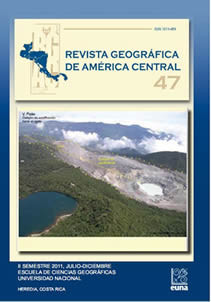SEÑALIZACIÓN TURÍSTICA EN COSTA RICA: HACIA UN MODELO ATRACTIVO Y RESPONSABLE EN CONDICIONES DE COMPETITIVIDAD Y SOSTENIBILIDAD
Keywords:
señalización turística, sostenibilidad, competitividad, estrategiasAbstract
Es sabido que una adecuada señalización turística puede repercutir favorablemente en el desarrollo turístico de un destino, con las consecuencias socioeconómicas positivas que de ello se derivan. No obstante, algunos análisis que se derivan del Plan Nacional de Turismo Sostenible de Costa Rica 2002-2012 determinan que esta es escaza o nula en rutas nacionales y otras carreteras. Aunado a ello, existe un vacío tanto académico como técnico-administrativo relacionado con la temática; lo que ha motivado la realización de este estudio. El mismo se organiza en tres partes. En la primera de ellas se revisan de forma breve las iniciativas y los convenios que anteceden el periodo comprendi-do entre los años 2004-2009. En la segunda parte, se describe el estado actual de la señalización tu-rística en Costa Rica, el cual abarca los años mencionados anteriormente. Finalmente, en la tercera parte se presentan cuatro estrategias a través de las cuales la señalización turística puede constituir un elemento diferenciador e innovador, capaz de incrementar la sostenibilidad y competitividad de nuestro país en el mercado global.Downloads
How to Cite
Issue
Section
License
Proposed policy for journals offering Open Access
Authors publishing their works in the Journal acknowledge and agree to the following terms:
a) Authors retain the copyrights to their works and guarantee the Journal the right to be the first to publish their works, under the Creative Commons License Attribution-NonCommercial-ShareAlike 4.0 International, CC BY-NC-SA 4.0 International (https://creativecommons.org/licenses/by-nc-sa/4.0/deed.es), which allows others to share works upon complying with the acknowledgment of authorship and mention of the Journal as the original publisher of the work.
b) Authors are permitted to separately establish additional agreements for the non-exclusive distribution of the official edition of the work published in the Journal (for example, authors may desire to place the work in an institutional repository or incorporate it into a book that is to published elsewhere) so long they acknowledgment to recognize the Journal as the original publisher. The aforementioned additional agreements must respect the terms of the non-profit character and sharing philosophy of the original license (CC BY-NC-SA 4.0 International, https://creativecommons.org/licenses/by-nc-sa/4.0/deed.es).
c) Authors are encouraged to archive the post-print or editor/PDF version in Open Access repositories.






 REVGEO is licensed under https://creativecommons.org/licenses/by-nc-sa/4.0/deed.es
REVGEO is licensed under https://creativecommons.org/licenses/by-nc-sa/4.0/deed.es
.svg_4.png)

_(1).png)
_(1)_(1)_(1)_1.png)
(2)(1)(1)(1).png)
